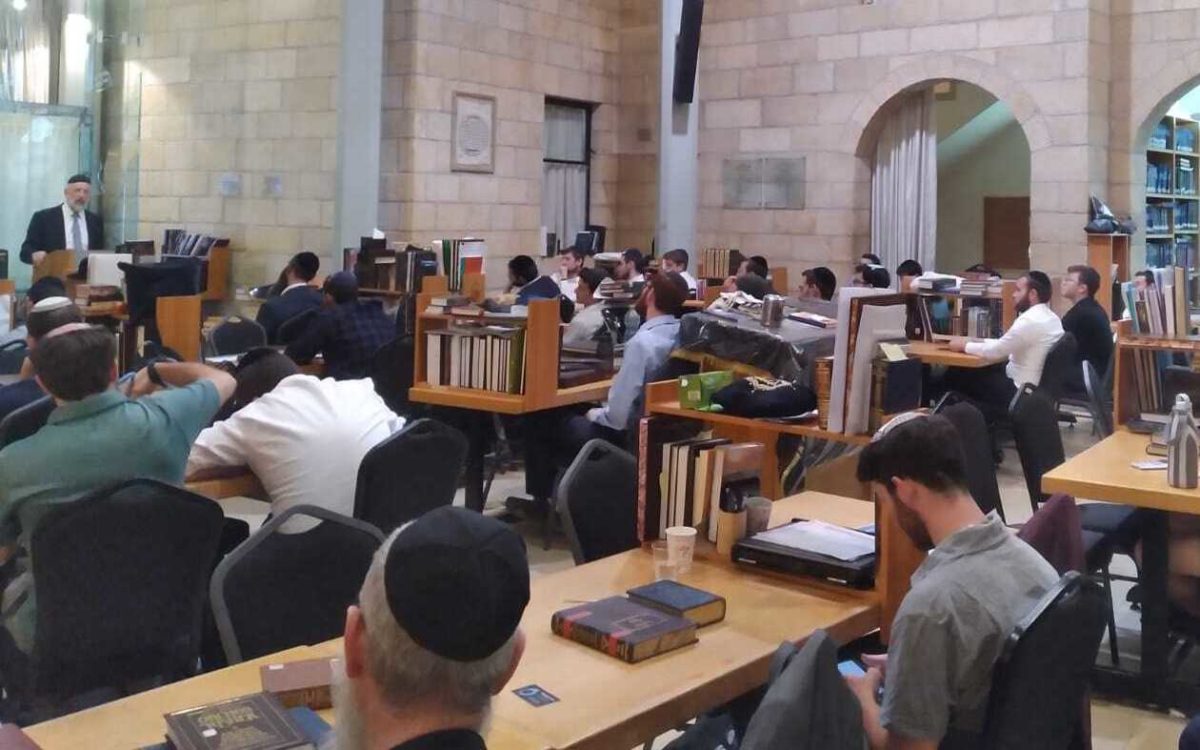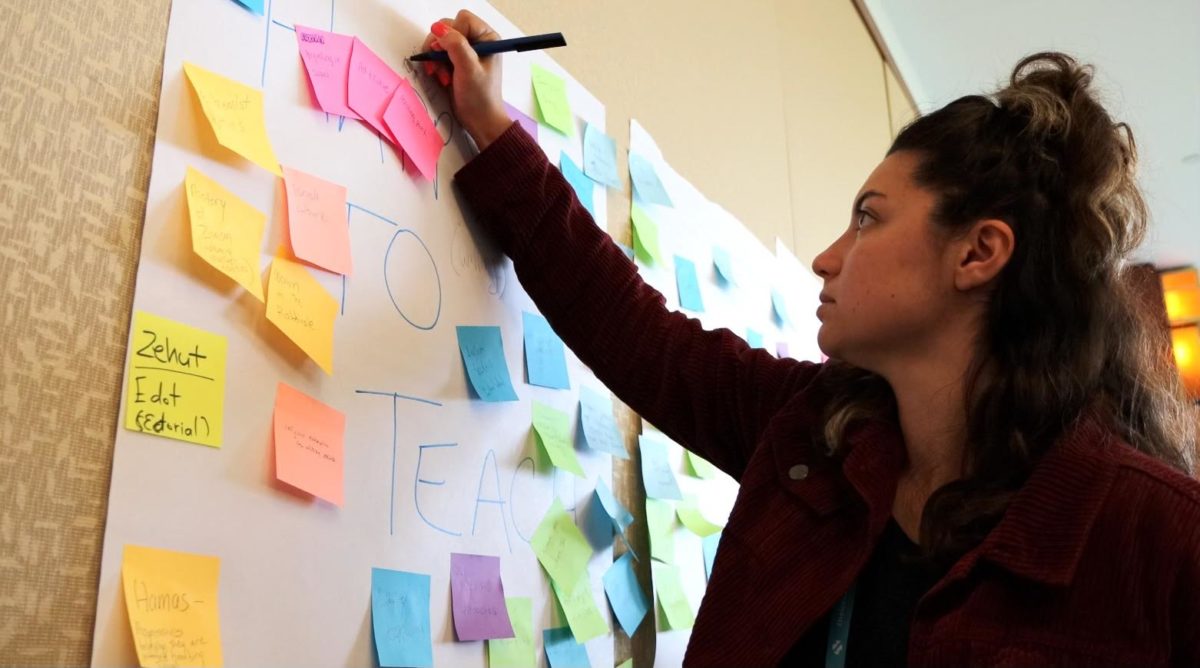Your Daily Phil: A new yeshiva in Boca + Engaging synagogue membership
Good Wednesday morning!
One painting, a gift to his sister, depicts deer set against desert mountains as a boy with a recorder sits under a tree. Another, of a dove, he gave to his father. These works, by the fallen Israeli soldier Hadar Goldin, have helped keep his memory alive in the nearly eight years since he was killed in the 2014 Gaza War. And displaying them in a traveling exhibit is one piece of his parents’ campaign to secure the return of his body, which has been held by Hamas since he was killed.
Goldin was 23 when he was killed in Gaza on Aug. 1, 2014, during a cease-fire brokered by the U.S. and U.N. Since then his parents, Leah and Simcha Goldin, have pressed for the return of his body and that of another fallen soldier, Oron Shaul, also being held by Hamas. Much of their advocacy involves meeting with government officials, which they have done relentlessly, including meetings over the past week with the Biden administration, State Department, members of Congress and United Nations officials.
The exhibit of Goldin’s impressionistic art is another way his parents have sought to bring their son’s story to the public — including American Jews. They began showing his work in Israel on the first anniversary of his death, and have since displayed it in venues across the U.S. and world, from U.N. headquarters to synagogues and other Jewish institutions. Now, after a two-year pandemic break, the exhibition of 20 paintings is back on, opening today at the Kaiserman JCC in Philadelphia.
“This is the legacy he has left us,” Leah Goldin told eJewishPhilanthropy. “The exhibit is the beauty Hadar left us, and we want everyone to be part of the experience, and help us, from that goodness, to bring him home.”
For the JCC, the exhibit, which runs until June 17, is part of telling the Jewish story, CEO Alan Scher told eJP. “They’re really, really lovely, poignant works that tell [the story of] the coming of age of an artist.” The painting of deer “speaks to the beauty and possibility inherent in the future that unfortunately was taken away from us.”
Although it’s been nearly eight years since Goldin was killed, his mother feels that last May’s conflict between Hamas and Israel in the Gaza Strip has provided an opening to push for the return of his body. She hopes to convince American lawmakers to condition any funding for Gaza rehabilitation on the return of his and Shaul’s bodies.
But on another level, she hopes that audiences in Philadelphia and beyond will get to know her son through his art. The family has also published an edition of “The Path of the Just,” an 18th-century Jewish philosophical text, with his notes. She said the experience of watching him paint was “the best thing in the world.”
“It was wonderful,” she said, “because I now understand that he gave us his experience through his paintings.”
school ties
New yeshiva in Boca aims to put South Florida on the map for Torah learning


Courtesy
At the start of the COVID-19 pandemic, an exodus from New York to the Sunshine State made national news, with emigres ranging from investment bankers to crypto entrepreneurs to ocean enthusiasts. For those in South Florida’s Jewish community, the arrival of newcomers from New York was nothing new. But as South Florida’s Orthodox community has ballooned, locals have acknowledged that the area’s Jewish educational institutions are not yet a match for the scale and breadth on offer in New York and New Jersey. That is starting to change, beginning with the opening this fall of a new residential yeshiva in Boca Raton that will offer intensive Torah study as well as the option to earn a bachelor’s degree, Jewish Insider’s Gabby Deutch reports.
Well-rounded: The Yeshiva of South Florida (YOSF) is offering something akin to a liberal arts college, but instead of courses in Western civilization’s Great Books and philosophical discussions on John Locke, the curriculum, like those at yeshivas worldwide, features the Talmud and debates that were started by Torah sages of past generations. Rather than a tree-lined quad in New England, YOSF offers palm trees and year-round warmth — perfect, perhaps, for walking to synagogue. “South Florida, I just think, is a comfortable, joyful, happy existence for most people,” said Rabbi Simcha Shabtai, who oversees learning initiatives at YOSF, “and for that to be the backdrop of this intensive pursuit really complements it very nicely.”
Full-campus experience: “This is saying you’re going to have seven days a week of a program, and you’re going to have the entire experience. It’s more like a college campus,” said Shayna Weiss, associate director of the Schusterman Center for Israel Studies at Brandeis University. Compare that to a place like Yeshiva University, or other yeshivas that are in the middle of densely populated Orthodox communities like Brooklyn or Lakewood, N.J. “There are people [in those places] who can stay in, but it’s kind of lame. A lot of people go home, unless it’s an official Shabbaton,” or Shabbat program.
Class credit: The first group of students, which will include roughly a dozen college-aged men, will live and study on the campus beginning in August. Only a small minority of those students will be from Florida. Annual tuition at the yeshiva is $12,000, with the option of an additional $18,000 to take classes remotely at New York City’s Touro College, with substantial financial aid available. Students can count their year of learning in Israel as credit toward a Touro degree, so most will be at YOSF for three years.
core offerings
Sinai circles: Engaging synagogue members


iStock
“Like many rabbis and congregational lay leaders, I am watching the trends of synagogue member involvement very closely. It is no surprise to any reader that what used to work is no longer working. But is it even fair to say that it ‘used to work?’ We built buildings that were pragmatic and honest — a reasonably sized sanctuary that could expand for a couple of days a year to accommodate attendance on the High Holy Days. Is that what high-functioning looks like?” asks Rabbi Jay TelRav, spiritual leader of Temple Sinai in Stamford, Conn., in an opinion piece for eJewishPhilanthropy.
Low percent of engagement: “At Temple Sinai, we have about 1,200 individuals on our membership roster and we see about 50 regular attendees at prayer services, with many others dropping by as their heart needs it. Our religious education program for youth and adults functions about as well as most, but that still only translates to about 170 kids and another 30 adult learners, on average. We have lots of volunteers feeding, housing and advocating for the needs of the larger community — maybe 30 regulars. And we have others who join us for social programming, volunteer leadership and committee work — maybe another 40-50 people. If we were to stretch the numbers and claim no overlap between those groups of people, we’d be regularly engaging about 300 people on a regular basis — but not the other 900.”
We are not a gym: “In fact, like a gym that relies on a business model of subscribers who never actually walk through the door, our operations could never handle the addition of 900 participants in congregational activities.”
Read the full piece here.
israel education
Finding our place on the map of conflict education


Courtesy of the iCenter
“There is abundant literature on teaching controversial issues, educating through difference, exploring multiple narratives, providing proper historical context and much more,” writes Alex Harris, project manager for The iCenter’s Conflict Education Initiative, in an opinion piece for eJewishPhilanthropy.
Everybody’s talking about it: “Clearly, [the Israeli-Palestinian conflict] is a core topic and key concern within Israel and Jewish education circles. We found that over 60 different Jewish organizations had individual lesson plans, media, resources, lectures, events or other educational materials on the conflict.”
Few know how to talk about it: “While there is a treasure trove of ‘what’ to teach, there is insufficient focus on ‘how’ to teach it. In our focus groups, we found that many educators are hesitant to engage with the topic altogether. Some lack the necessary background and/or pedagogical skills to teach about the Israeli-Palestinian conflict confidently and competently. Others struggle to balance the directives of multiple stakeholders: parents, students/participants, organizations, as well as their own feelings.”
Worthy Reads
Take the Credit, Take the Blame: If a CEO takes credit for their company’s achievements, they may be seen in the future as responsible for company failures, even if other factors are at play. That’s why — Nandini Rajagopalan, Sun Hyun Park and Sung Hun (Brian) Chung write in Harvard Business Review — their research suggests that leaders “adopt a long-term approach to impression management”: “The forceful CEO who is seen as singlehandedly saving the company can, a few years later, be viewed as singlehandedly responsible for its failure, regardless of extenuating circumstances… Taking the lion’s share of credit for your company’s successes may be tempting in the moment (especially if your compensation is largely tied to self-reported updates), but this strategy can quickly backfire when the tides turn against you. Plus, prior research suggests that more-humble CEOs enjoy better market performance and more positive relationships with both fellow executives and middle managers — so there’s more than one reason to err on the side of humility.” [HBR]
Grief is Everywhere: Children are suffering from grief, and philanthropy can help by incorporating bereavement into broader mental health strategies, Sara Deren writes in The Chronicle of Philanthropy. “Part of the problem is that philanthropy doesn’t have clear ways to categorize and elevate childhood bereavement. Does the issue fall under youth development and programming? Mental health? Covid-19 response? Racial justice? Education? Childhood grief is of course part of all those issues — and many more… Donors also need to recognize that this is about more than funding one program, one time. Children often re-experience grief through young adulthood and need the continuity of a supportive community throughout key developmental milestones. Peer-support programs can be especially important for kids and caregivers who feel adrift and alone after a loss.” [ChronicleofPhilanthropy]
Community Comms
Be featured: Email us to inform the eJP readership of your upcoming event, job opening, or other communication.
Word on the Street
Princeton alumnus Rabbi Gil Steinlauf will become executive director of the Center for Jewish Life, Princeton Hillel, effective July 1…
Jessica Greenblatt Seeley and Meir Lakein have been appointed co-executive directors of Boston-based JOIN for Justice…
Women of Reform Judaism, through its YES (Youth, Education, & Special projects) Fund, has awarded $300,500 in grants to 20 programs aimed at strengthening Jewish life and providing support for religious, social and educational growth in North America, Israel and worldwide…
The Israeli Education Ministry and the Jerusalem Municipality jointly opened the OECD International Education Innovation Conference on Tuesday…
OneTable launched the Pride Shabbat initiative to celebrate Pride Month and the LGBTQ+ community…
Kalush Orchestra, the Ukrainian band that won the Eurovision song competition, auctioned off its trophy and the pink bucket hat worn by its lead singer for more than $1.2 million, which will be used by the Serhiy Prytula Charity Foundation to buy three drones that the Ukrainian army can use for surveillance…
City of Hope, a California-based national cancer research and treatment organization, received a $10 million gift from the Sheri and Les Biller Family Foundation to expand access to evidence-based supportive care medicine and advocacy efforts…
Mark Pincus, founder of social games developer Zynga, has signed the Giving Pledge…
Rabbi Pinchas Stolper, first full-time national director of NCSY and the longest-serving executive vice president of the Orthodox Union, died at 90…
Pic of the Day


Courtesy of The Jewish Federations of North America
A group of 180 new immigrants from Ethiopia landed today at Israel’s Ben Gurion Airport on the first of a series of flights planned over the next several months. The flights mark the continuation of Operation Zur Israel, which will bring 3,000 Ethiopian immigrants to the country, and are chartered by The Jewish Agency for Israel.
Birthdays


Amin Mohammad Jamali/Getty Images
NYC-born Israeli pairs skater, she competed for Israel at the 2022 Winter Olympics, Hailey Esther Kops…
Pulitzer Prize-winning composer, pianist and conductor, Yehudi Wyner… Holocaust survivor as a child, he served as the Ashkenazi chief rabbi of Israel (1993-2003) and twice as chief rabbi of Tel Aviv (1993-1998 and 2005-2017), Rabbi Yisrael Meir Lau… Founder and dean of Beth Jacob Jerusalem, a women’s seminary located in Jerusalem, Rebbetzin Bruria David… NYC-based attorney, author of two books regarding the history and operations of El Al, Marvin G. Goldman… Grammy Award-winning classical pianist, Richard Goode… Former member of the Knesset for the Yisrael Beiteinu party, Shimon Ohayon… Retired attorney in Berkeley, Calif., Thom Seaton… Pediatrician in the San Francisco Bay area, Dr. Elliot Charles Lepler… Former member of the Knesset for the Shinui and the Hilonit Tzionit parties, Eti Livni… Founding editor of The American Interest, Adam M. Garfinkle… Former editor-in-chief of Bloomberg News and co-author with Michael Bloomberg of Bloomberg by Bloomberg, Matthew Winkler… Former IDF officer and now a London-based political scientist and journalist, Ahron “Ronnie” Bregman… Former member of the Knesset for the Shas party, Amnon Cohen… Majority owner of MLB’s Oakland Athletics, his parents were the co-founders of Gap, Inc., he is the chair of Knowledge is Power Program (KIPP) Foundation, John J. Fisher… Poet, performance artist and essayist, Adeena Karasick…. Founding editor and publisher of the Dayton Jewish Observer, Marshall J. Weiss… Television personality and matchmaker, Sigalit “Siggy” Flicker… Actress and film director, Danielle Harris… Contributing editor at the Daily Beast, Spencer J. Ackerman… Comedian, writer, actress and producer, Amy Schumer… Partner at management consulting firm Oliver Wyman, Daniel Tannebaum… Musician, songwriter and author, Ari Seth Herstand… Executive director of MoveOn Political Action, Ilya Sheyman… Political reporter for NBC News and MSNBC, Alex Seitz-Wald… Senior reporter at CNN Business, Nicole Goodkind… Privacy and civil liberties engineer at Palantir Technologies, Naomi S. Kadish… Isabel Keller…
Email Editor@eJewishPhilanthropy.com to have your birthday included.








